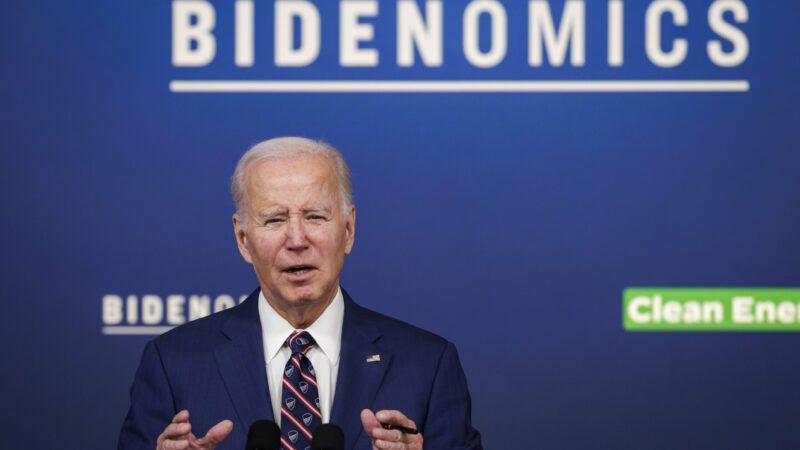Biden's Bizarre 'Shrinkflation' Nonsense
The White House should stop taking policy and messaging tips from Elizabeth Warren.

When President Joe Biden was running for office in 2020, he explicitly promised that putting him in the White House would mean that "you'll actually see your standard of living go up and your costs go down."
That, uh, hasn't happened.
We don't need to relitigate the entire economic history of the Biden administration in this space, but here's a quick recap: Inflation surged to a 40-year high, peaking above 9 percent in June 2022. Prices are now rising less quickly, but inflation remains well above the Federal Reserve's target rate of 2 percent. (It was 3.4 percent for the 12 months ending in December. We'll get January's numbers on Tuesday morning.) Biden's policies—specifically, the $2 trillion spending package he signed in March 2021—certainly contributed to that inflationary spiral. Economists will continue to debate how much of a factor it was, but voters tend to operate on a more facile level of rewarding presidents for good economic times and punishing them for bad economic times. And rightly or only semi-rightly, Biden's name is attached to this bout with inflation.
You might expect the president, now that he's in the middle of a re-election campaign, to try to avoid anything to do with that topic. Don't remind voters of how rough the past few years have been, focus on the future, talk about the positive signals coming from the economy, and above all else don't make yourself look like an old man yelling at a cloud.
In short, don't do this:
While you were Super Bowl shopping, did you notice smaller-than-usual products where the price stays the same?
Folks are calling it Shrinkflation and it means companies are giving you less for every dollar you spend.
I'm calling on the big consumer brands to put a stop to it. pic.twitter.com/wL1NsEh78F
— President Biden (@POTUS) February 11, 2024
Biden declined to do the traditional Super Bowl Sunday interview with the network hosting the game, and instead the White House released an economically illiterate and politically confusing video of Biden railing against "shrinkflation"—when you get few chips in a bag or less ice cream in a carton, as Biden claims.
Yes, this is a real phenomenon—one that most Americans dislike. It is, obviously, a direct consequence of inflation. If the marginal cost of producing every chip goes up (because potatoes or corn or labor gets more expensive), then a bag of 100 chips is either going to cost slightly more or become a bag of 90 chips and cost the same.
Given that reality, Biden telling companies that he wants them to stop shrinking their products is a bit bizarre: If they did what he asked, prices would almost certainly rise. Is that really what the White House wants?
A different version of this video might lean harder into trying to blame corporations for inflation and the resulting "shrinkflation." Sen. Elizabeth Warren (D–Mass.) has been on that kick for a while. That is also nonsensical, because corporate greed doesn't rise and fall periodically, as Warren seems to believe.
But Biden doesn't even try to go down that path. He doesn't threaten to take any action against companies engaged in "shrinkflation" and doesn't call any of them out by name. All he accomplishes here is reminding voters of a sneaky way that inflation is still robbing their wallets.
As a political matter, this video is effectively a flashing sign telling voters: "Hey, did you think inflation was less bad now? Actually, it's still happening!" In what world is that helping Biden? For that matter, when was the last time the president actually bought himself a pint of ice cream or a bag of chips—with his own money, in a real grocery store? The more you think about it, the less sense this video makes. The White House should probably stop taking messaging advice from Warren.
The time to fix inflation is before it starts. Once it gets rolling, it is difficult to control and tends to make voters (understandably) quite irritable. There's nothing Biden can do, at this point, to fix "shrinkflation," so the most powerful man in the world is reduced to looking like an out-of-touch old guy shaking his fist at the sky. That's an accurate image, but probably not the one the White House intended to send.


Show Comments (88)